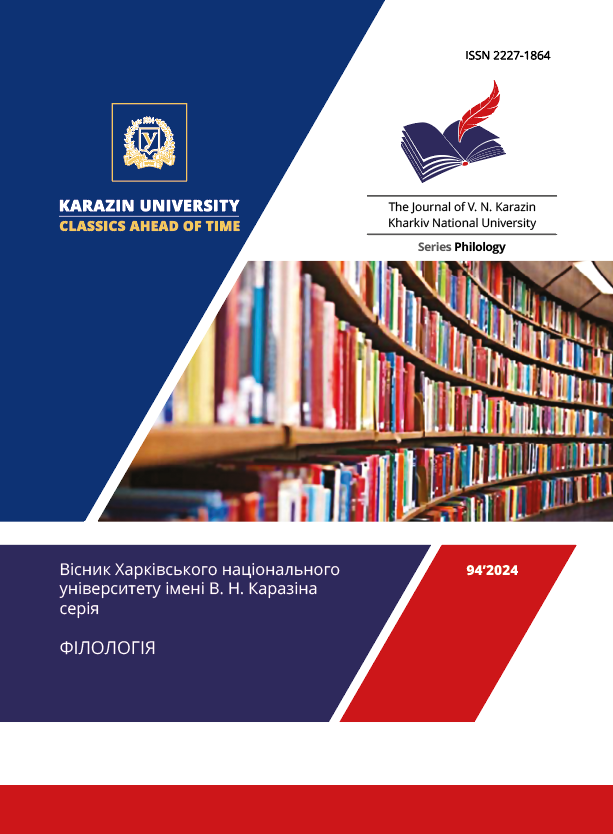Reflection of the Dynamics of the Language Grammatical Sub-system through the Prism of the Notion of Absence
Abstract
The notion of absence is viewed as a linguo-cognitive phenomenon that has certain means of its representation in language. The purpose of the article is to trace the changes in the Russian grammar in correlation with the notion of absence, which is semantically heterogeneous and reveals the national specifics of the studied language. The research methodology is based on the principle of historicism. The tasks of distinguishing between past and present phenomena outlined in the study have been solved using the method of actualization. Explanation of the appearance of empty links in the structure of the Russian language is based on cognitive studies of the notion absence. Since asymmetric relations penetrate into all levels of the language system, and the theory of oppositions reflects the essential characteristics of language, the abstract notion of absence is foregrounded in explaining the privative nature of a language. Studies of the essence and the phenomenon of the notion of absence in the grammatical system resulted in the following ideas: manifestations of the notion of absence reflect grammatical lacunae that may correlate with different semantic types of the notion of absence in Russian grammar. Based on the historical facts of the Russian language and their cognitive interpretation, three semantic types of the notion of absence have been conventionally distinguished: complete absence, recovered absence, and disappearance. In the methodological aspect, the article combines psychological and socio-cultural vectors. The research methodological foundation made it possible to trace and describe lexical and grammatical mechanisms of forming the notion of absence at the grammatical level of the Russian language system.
Downloads
References
Beloshapkova, T.V., 2008. Kognitivno-diskurssivnoe opisanie kategorii aspektual’nosti v sovremennom russkom yazyke. [Cognitive-discourse description of the category of aspect in modern Russian]: diss. dokt. filol nauk. M.: Gosudarstvennaya akademiya slavyanskoj kul’tury. 395 p. [In Russian]
Boduen de Kurtene, I.A., 1963. Chelovechenie yazyka. [Humanization of the language]. Izbrannye trudy po obshchemu yazykoznaniyu. T. 1. M.: Izd-vo AN SSSR. P. 258–264. [In Russian]
Cyganenko, G.P., 1989. Etimologicheskij slovar’ russkogo yazyka. [Etymological dictionary of the Russian language].2-e izd., pereab. i dop. K.: Rad. shk., 511 p. [In Russian]
Epshtejn, M.N., 2007. O tvorcheskom potenciale russkogo yazyka. Grammatika perekhodnosti i tranzitivnoe obshchestvo. [On the creative potential of the Russian language. Grammar of Transition and Transitive Society]. Znamya. № 3. URL: http:// magazines. russ. ru/ snamia 2007/ 3/ ep 18. html. [In Russian]
Givon, T., 2015. Slozhnost’ i razvitie. [Complexity and development]. Yazyk i mysl’: Sovremennaya kognitivnaya lingvistika / Sost. A.A. Kibrik, A.D. Koshelev; red. A.A. Kibrik, A.D. Koshelev, A.V. Kravchenko, Yu.V. Mazurova, O.V. Fedorova. M.: Yazyki slavyanskoj kul’tury. P. 89–122. [In Russian]
Zagnіtko, A.P., 2008. Teorіya suchasnogo sintaksisu [Theory of the modern syntax]: monografіya. Donec’k: DonNU. 294 p. [In Ukraine]
Kovtunova, I.I., 2010. “Nesobstvenno pryamaya rech’” v yazyke russkoj literatury konca XVIII–pervoj poloviny XIX v. [“Inappropriately direct speech” in the language of Russian literature at the end of the in the late 18th – first half of the 19th century]. Publikaciya A.G. Grek. M.: Izdatel'skij centr «Azbukovnik». 285 p. [In Russian]
Kubryakova, E.S., 2004.Yazyk i znanie: Na puti polucheniya znanij o yazyke: Chasti rechi s kognitivnoj tochki zreniya. Rol’ yazyka v poznanii mira. [Language and Knowledge: Towards the Knowledge of Language: Parts of Speech from a Cognitive Perspective. The language role of in the world cognition of]. Ros. Akademiya nauk. In-t yazykoznaniya. M.: Yazyki slavyanskoj kul’tury. 560 s. [In Russian]
Lavrovskij, P.A., 1852. O yazyke severnyh Russkih letopisej. [About the language of the northern Russian chronicles]. Sankt-Peterburg: Imperatorskaya Akademiya nauk. 160 p. [In Russian]
Lopatin, V.V., 2007. Mnogogrannoe russkoe slovo: Izbrannye stat’i po russkomu yazyku. [The Multifaceted Russian Word: Selected Articles on the Russian Language]. Rossijskaya akademiya nauk. Institut russkogo yazyka im. V.V. Vinogradova. M.: “Izdatel'skij centr “Azbukovnik”. 743 p. [In Russian]
Popov, S.L., 2013. Kognitivnye osnovaniya evolyucii form russkogo sintaksicheskogo soglasovaniya [Cognitive foundations of the evolution of forms of Russian syntactic agreement]: monografiya. Har’kov: “NTMT”. 150 p. [In Russian]
Remnyova, M.L., 2015. Kategoriya vremeni v predstavlenii russkih knizhnikov XVI –XVII vv. [The category of tense in the view of Russian scribes of the 16th – 17th centuries]. M.: Filologicheskij fakul’tet MGU imeni M.V. Lomonosova. №6 (14). P. 10–35. [In Russian]
Russkaya grammatika. [Russian grammar]. [Gl. red. N.Yu. Shvedova]. V 2-h t. T. I. Fonetika. Fonologiya. Udarenie. Intonaciya. Slovoobrazovanie. Morfologiya. M.: Nauka, 1980. 784 p. [In Russian]
Palatovskaya, E.V., 2019. Slozhnoe predlozhenie v kognitivno-diskursivnom aspekte. [Complex sentence in cognitive-discursive aspect]: monografiya. Kiev: PP «Firma «Granma». 400 p. [In Russian]
Skorobogatova, E.A., 2012. Grammaticheskie znacheniya i poeticheskie smysly: poeticheskij potencial russkoj grammatiki (morfologicheskie kategorii i leksiko-grammaticheskie razryady imeni) [Grammatical meanings and poetic meanings: poetic potential of Russian grammar (morphological categories and lexico-grammatical categories of the name)]: monografiya. Har’kov: NTMT. 480 p. [In Russian]
Skorobogatova E.A. Formy obrashcheniya v russkoj poezii XX–XXI vekov. [Forms of address in Russian poetry of the 20–21 centuries]. Russkaya filologiya. Vestnik Har’kovskogo nacional’nogo pedagogicheskogo universiteta imeni G.S. Skovorody. Har’kov, 2017. № 1 (60). P. 38–42. [In Russian]
Haburgaev, G.A., 1990. Ocherki istoricheskoj morfologii russkogo yazyka: Imena. [Essays on the historical morphology of the Russian language: Names]. M.: Nauka. 296 p. [In Russian]
Yakobson, R., 1985. Izbrannye raboty. [Selected works]. M.: Progress. 456 p. [In Russian]




